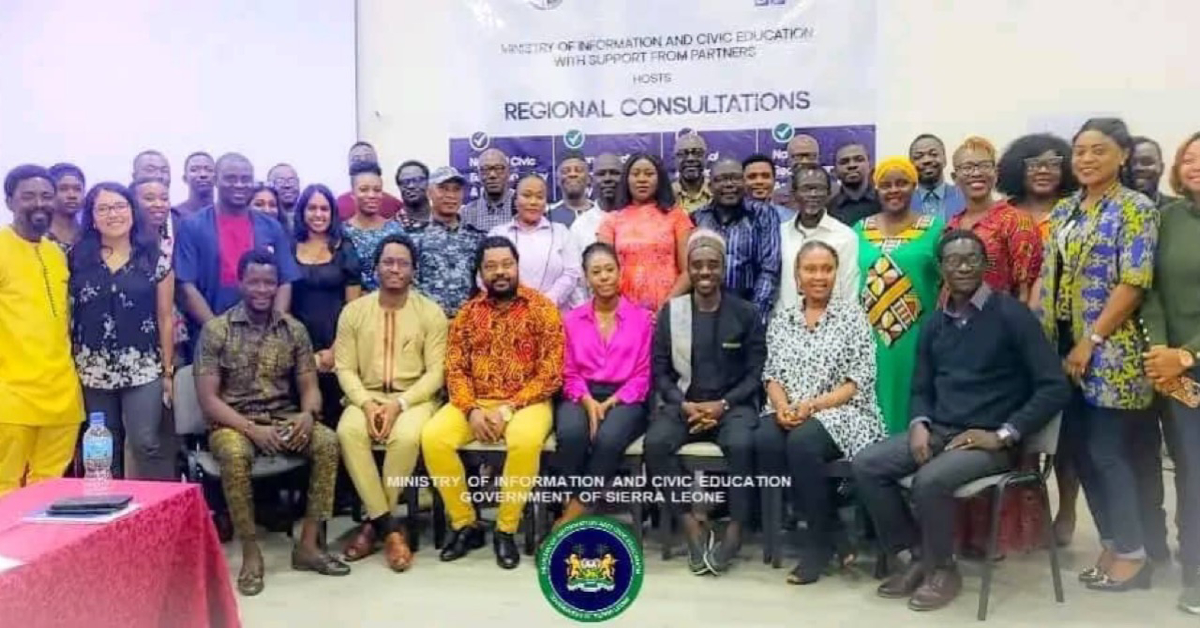The Ministry of Information and Civic Education (MoICE), with support from the United Nations Development Programme (UNDP), Plan International, and New York University, held a significant two-day regional consultation for the Western Area on July 17th-18th, 2024.
The event, hosted at the New Brookfields Hotel Conference Hall on Jomo Kenyatta Road in Freetown, was a cornerstone initiative aimed at discussing and refining the National Civic Education Policy & Strategy, National Media and Information Policy, National Film Policy, and National Records and Archives Policy.
Minister of Information and Civic Education, Chernor Bah, emphasized the crucial role of media stakeholders in shaping a national media policy to address the pressing issues within the media sector in Sierra Leone. He stressed the ministry’s dedication to fostering press freedom and transforming the media landscape, which aligns with President Bio’s vision for a free and vibrant media space. “We are committed to advancing press freedom, creating a free media space, and transforming the media sector in Sierra Leone in alignment with President Bio’s vision,” he stated.
Minister Bah acknowledged the Media Reform Coordinating Group (MRCG), the Sierra Leone Association of Journalists (SLAJ), and other media professionals for their pivotal role in developing the policy. He assured that the policy, post-consultation, would be entrusted back to these groups, urging journalists to ensure its longevity and hold the ministry accountable.
Ahmed Sahid Nasralla, President of SLAJ, expressed his satisfaction with the progress made towards formulating a comprehensive national policy on information and media. He highlighted the policy’s potential to consolidate media development achievements in Sierra Leone, providing a structured framework for an inclusive and professional media ecosystem.
“A national policy on information and media will consolidate the many gains we have made in media development in Sierra Leone. It will provide a framework for an inclusive and professional media ecosystem,” Nasralla remarked. He also mentioned the creation of a National Coordination Committee focused on the safety and sustainability of journalists, underscoring that freedom of expression and press freedom are fundamental rights.
Francis Sowa, Head of the MRCG and a policy consultant for the process, pointed out the extensive nationwide consultations conducted to ensure the policy’s comprehensiveness. He expressed confidence in the draft policy, which is ready for stakeholder review and feedback.
Aminata Wurie, representing the UNDP, assured continued collaboration between UNDP and MoICE. She expressed excitement about the ongoing partnership and looked forward to future collaborative programs upon the completion of current initiatives. “UNDP is very excited to have a partnership with the Ministry of Information and Civic Education on a number of programs for 2024. When these programs are completed, they will be able to partner on more,” Wurie said.
Edward Kargbo, Country Director of the BBC Media Action Group, lauded the policy as a blueprint for media development in Sierra Leone. He congratulated Minister Bah and his team for their progress and expressed his organization’s enthusiasm for the policy’s future impacts.
The collaborative efforts and extensive consultations underscore a collective dedication to creating enduring policies that will foster a more inclusive and professional media environment in Sierra Leone. The regional consultation not only marked a significant milestone in policy development but also highlighted the commitment of various stakeholders to advance the media sector, ensuring its growth and sustainability for years to come.











